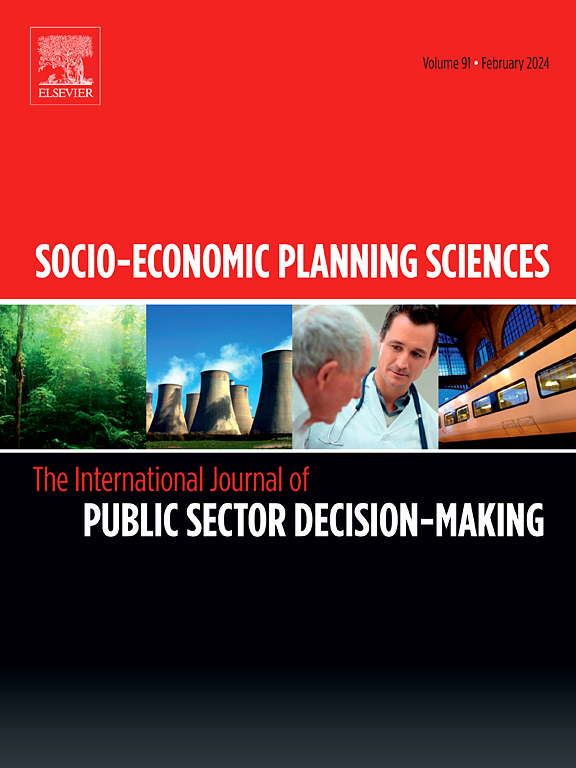Variable RTS in hierarchical network DEA: Enhancing efficiency in higher education systems
IF 5.4
2区 经济学
Q1 ECONOMICS
引用次数: 0
Abstract
This study presents a novel approach to Network Data Envelopment Analysis (DEA) by introducing “Returns to Scale (RTS) separation” within a hierarchical network DEA framework. Traditional DEA models, which often assume constant RTS, face limitations when analysing complex multi-functional structures. The proposed method, Variable RTS in Hierarchical Network DEA (VRS-HNDEA), addresses these limitations by integrating variable RTS, enabling a detailed efficiency analysis across hierarchical systems with heterogeneous sub-units. By utilising free variables, this model establishes distinct efficiency planes for simultaneous benchmarking of diverse subsystems, yielding a global efficiency frontier through the Minkowski addition of sub-system sets and analysed using an input-oriented enveloped form. Applied specifically to the higher education sector, the VRS-HNDEA model provides insights into the operational efficiency of various academic functions, including teaching, research, and administration. Key findings from this application demonstrate the model's ability to capture efficiency variations across hierarchical levels, supporting nuanced decisions on resource allocation and scale optimization. This framework, with its capability to recognise scale diversity across sub-systems, offers a significant tool for enhancing efficiency assessment in multi-layered public sector contexts, such as higher education, where comprehensive resource management is crucial.
分层网络 DEA 中的可变 RTS:提高高等教育系统的效率
本研究提出了一种新颖的网络数据包络分析(DEA)方法,即在分层网络 DEA 框架内引入 "规模回报(RTS)分离"。传统的 DEA 模型通常假定 RTS 恒定不变,在分析复杂的多功能结构时面临局限性。所提出的方法,即分层网络 DEA 中的可变 RTS(VRS-HNDEA),通过整合可变 RTS 来解决这些局限性,从而能够对具有异构子单位的分层系统进行详细的效率分析。通过利用自由变量,该模型建立了不同的效率平面,可同时对不同的子系统进行基准测试,通过子系统集的闵科夫斯基加法得出全球效率前沿,并采用以投入为导向的包络形式进行分析。将 VRS-HNDEA 模型具体应用于高等教育领域,可以深入了解教学、研究和行政等各种学术职能的运行效率。这一应用的主要研究结果表明,该模型能够捕捉各层级的效率变化,为资源分配和规模优化方面的细微决策提供支持。该框架能够识别各子系统之间的规模多样性,为加强多层次公共部门(如高等教育)的效率评估提供了重要工具,因为在这种情况下,全面的资源管理至关重要。
本文章由计算机程序翻译,如有差异,请以英文原文为准。
求助全文
约1分钟内获得全文
求助全文
来源期刊

Socio-economic Planning Sciences
OPERATIONS RESEARCH & MANAGEMENT SCIENCE-
CiteScore
9.40
自引率
13.10%
发文量
294
审稿时长
58 days
期刊介绍:
Studies directed toward the more effective utilization of existing resources, e.g. mathematical programming models of health care delivery systems with relevance to more effective program design; systems analysis of fire outbreaks and its relevance to the location of fire stations; statistical analysis of the efficiency of a developing country economy or industry.
Studies relating to the interaction of various segments of society and technology, e.g. the effects of government health policies on the utilization and design of hospital facilities; the relationship between housing density and the demands on public transportation or other service facilities: patterns and implications of urban development and air or water pollution.
Studies devoted to the anticipations of and response to future needs for social, health and other human services, e.g. the relationship between industrial growth and the development of educational resources in affected areas; investigation of future demands for material and child health resources in a developing country; design of effective recycling in an urban setting.
 求助内容:
求助内容: 应助结果提醒方式:
应助结果提醒方式:


